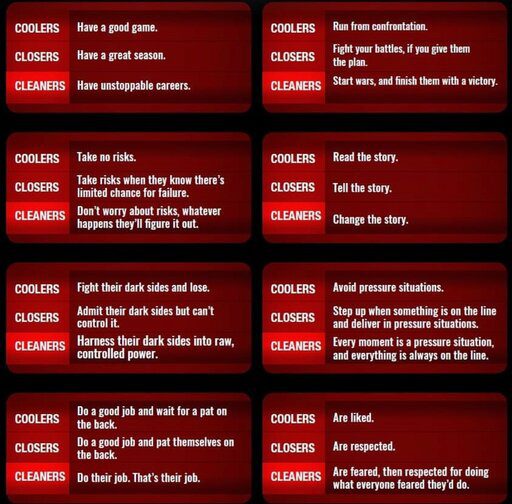Tim S. Grover was the trainer of some of the greatest elite NBA players and Hall of Famers such as Micheal Jordan, Kobe Bryant and Dwyane Wade. In his 2013 book, Relentless: From Good to Great to Unstoppable, Grover describes the mindset of the greatest elite champions. He categorized competitors into three types: Cooler, Closer and Cleaner.
Grover shares various stories and characteristics of the various competitor types. The book Relentless: From Good to Great to Unstoppable, is based on the 13 qualities exhibited by most cleaners.
When You’re a Cleaner . . .
#1. You keep pushing yourself harder when everyone else has had enough.
#1. You get into the Zone, you shut out everything else, and control the uncontrollable.
#1. You know exactly who you are.
#1. You have a dark side that refuses to be taught to be good.
#1. You’re not intimidated by pressure, you thrive on it.
#1. When everyone is hitting the “In Case of Emergency” button, they’re all looking for you.
#1. You don’t compete with anyone, you find your opponent’s weakness and you attack.
#1. You make decisions, not suggestions; you know the answer while everyone else is still asking questions.
#1. You don’t have to love the work, but you’re addicted to the results. #1. You’d rather be feared than liked.
#1. You trust very few people, and those you trust better never let you down. #1. You don’t recognize failure; you know there’s more than one way to get what you want.
#1. You don’t celebrate your achievements because you always want more.
Coolers
A Cooler is careful; he waits to be told what to do, watches to see what everyone else is doing, and then follows the leader. He’s a mediator, not a decision-maker; he’s not taking sides unless he’s forced to. He can handle a certain amount of pressure when things are going well, but when things get too intense, he kicks the problem over to someone else. He can make a huge play, but he’s not ultimately responsible for the outcome. He’s the setup guy, keeping things cool until the Closer or Cleaner can take over.
Closers
A Closer can handle a lot of pressure; he’ll get the job done if you put him in the right situation and tell him exactly what you need him to do. He’ll study all sorts of scenarios so he can anticipate what might happen, but he’s uncomfortable when faced with something unexpected. He seeks attention and credit, and he’s very aware of what everyone else is doing and what others think of him. He loves the rewards and perks associated with his fame and would choose financial security over winning or success.
Cleaners
Cleaners are rule-breakers when they have to be; they only care about the end result. When things go wrong and everyone else starts to panic, the Cleaner is calm and unflappable, cool and steady, never too high or too low, never too happy or too depressed. He never sees problems, only situations to resolve, and when he finds the solution, he doesn’t waste time explaining it. He just says, “I got this.” And when it’s over and he gets the results, all the others just stand there, shaking their heads in disbelief, wondering how he did it. Failure is never an option; even if it takes years, he’ll find a way to turn a bad situation to his benefit, and he won’t stop until he succeeds.
The Closer can win the game if given the opportunity, but the Cleaner creates the opportunity. The Closer can be the star, but the Cleaner maneuvered him into the job. Cleaners never need a kick in the ass. Everyone else does.
• Coolers can have an amazing game.
• Closers can have an amazing season.
• Cleaners have amazing careers.
• Coolers worry about the competition and how they measure up.
• Closers study the competition and plan their attack based on the opponent.
• Cleaners make the competition study them; they don’t care whom they’re facing, they know they can handle anyone.
• Coolers avoid taking the winning shot.
• Closers take the shot if they know they have a good chance of making it.
• Cleaners just trust their gut and shoot; theydon’t have to think about it.
• Coolers won’t offer to take on a role they’re not comfortable with.
• Closers will take the role if you ask them and they’ll do it well, if they have enough time to prepare for and study the situation.
• Cleaners don’t wait to be asked, they just do o be asked, they just do it.
• Coolers let others decide whether they’re successful; they do the job and wait to see if you approve.
• Closers feel successful when they get the job done.
• Cleaners never feel as if they’ve achieved success because there’s always more to do.
• Coolers don’t want to carry the team, but they’re the first to slap you on the back when you do a good job.
• Closers want the credit for getting the job done and love being congratulated for what they did.
• Cleaners rarely congratulate you for doing your job, they just expect you to do it.
• Coolers think they want the spotlight, but when they get it, they usually handle it badly.
• Closers stand in front because they need to show who’s in charge.
• Cleaners don’t have to show who’s in charge—everyone already knows.
• Coolers will eat whatever you feed them.
• Closers will order what they want and be satisfied with a great meal.
• It doesn’t matter what a Cleaner eats, he’ll still be hungry again in an hour.
All the Best in your quest to get better. Don’t Settle: live with Passion.

Comments are closed.